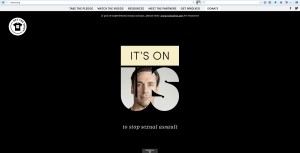In 2014 the White House launched a new Public Service Announcement (PSA) campaign to help combat sexual assault at the nation’s colleges and universities. Titled “It’s On Us,” the campaign uses celebrities to help raise awareness about the problem – what some are calling an epidemic – of sexual assault and rape in higher education.

This issue has received much attention from policymakers as well as the media over the last few years. The U.S. Department of Education, through its enforcement of Title IX of the Higher Education Act of 1965, has stepped up its oversight of how colleges adjudicate reports of sexual harassment and assault. The recent case of Brock Turner, a Stanford University student athlete convicted of sexually assaulting a woman while she was unconscious – and who received only a 6-month prison sentence for the act – has brought the issue to the forefront of the news once again.
The It’s On Us campaign has been very visible; I see its PSAs on television and the web quite frequently. The messages promoted by the campaign are important and critical ones, not just for raising awareness about sexual assault, but also in suggesting tools to help combat it.
But one of the campaign’s PSAs I saw recently bothered me. The PSA titled, “It’s On Us: One Thing,” focuses on the importance of consent in sexual relationships. Using well-known television and movie actors, the 30-second video opens with these lines:
There’s one thing you can never have sex without. It’s not something you buy, or something you take. In fact, there’s only one way to get it. It has to be given to you, freely. It’s consent. Because sex without it isn’t sex. It’s rape.
So far, so good. This is an excellent and effective way of highlighting the moral and legal importance of consent in relationships.
But then the PSA veers into territory that I think is potentially misguided and damaging, by adding the tagline at the end:
Consent: If you don’t get it, you don’t get it.
The tagline could be read in one of two ways, and I am not sure which the authors intended (a search on the web did not reveal an answer to this question). Clearly the “it” in the first clause refers to consent. But the second clause is more ambiguous; one interpretation could be that “you don’t get it” means “you don’t understand,” i.e., if you don’t get consent, you don’t understand the importance of it.
But I worry that the “it” in the second clause could refer to sex, i.e., that if you don’t get consent, then you are not entitled to “get” sex. What bothers me about this is the implication that one party “gives” sex to the other in a unidirectional relationship, rather than sexual relations being a mutual act on the part of both parties, with the two both giving and receiving.
The great majority, though not all, cases of sexual assault on college campuses involve men accused of attacking women. So this messaging could be to saying to men, “If you don’t get consent, you’re not going to get sex.” The implication is that sex is something that women give to men, which I believe is a misguided and archaic view of how relationships between men and women (or any two people) should be developed to best promote mutual respect.
I don’t know if this was the intent of the developers of the PSA, but this was certainly how I heard the message. And I worry that it may be reinforcing this misguided view of what a healthy relationship between two people should be.